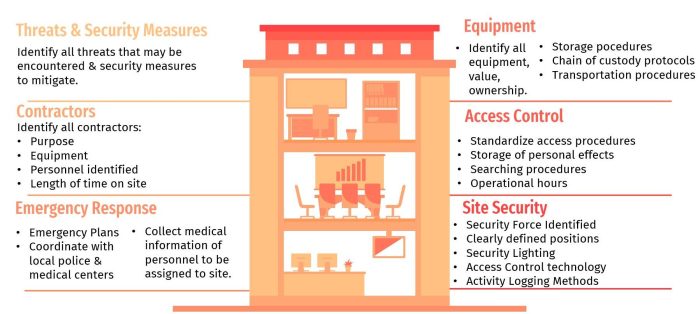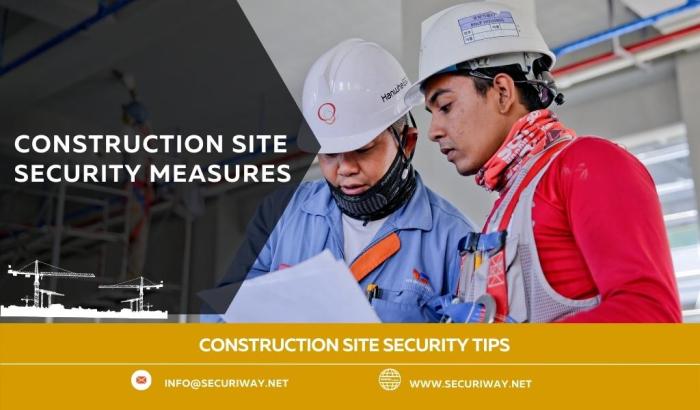Construction site security measures are paramount for safeguarding assets and personnel. From potential risks to advanced technologies, this discussion delves into the crucial aspects of ensuring safety and protection in construction sites.
Exploring the various security measures implemented, the role of technology, and the importance of training, this overview provides a comprehensive understanding of construction site security protocols.
Importance of Construction Site Security Measures
Construction site security measures are essential to ensure the safety of personnel, protect valuable equipment and materials, and prevent unauthorized access or vandalism. Without proper security measures in place, construction sites are vulnerable to various risks that can significantly impact the progress and success of the project.
Potential Risks and Needs for Security Measures
- Theft: Construction sites often contain expensive equipment, tools, and materials that are attractive targets for thieves. Without adequate security, these items can be easily stolen, leading to financial losses and project delays.
- Vandalism: Unauthorized individuals may tamper with equipment, machinery, or structures on a construction site, causing damage that can be costly to repair and disrupt the construction process.
- Trespassing: Intruders entering a construction site without authorization pose a safety risk to themselves and the construction workers. They may also interfere with the progress of the project and compromise the security of the site.
Impact of Inadequate Security
Inadequate security measures on construction sites can have serious consequences, including delays in project timelines, increased costs due to theft or damage, compromised safety of personnel, and potential legal liabilities. By implementing robust security measures, construction companies can mitigate these risks and ensure the successful completion of their projects.
Common Construction Site Security Measures
Construction sites are vulnerable to theft, vandalism, and accidents, making security measures crucial to protect workers, equipment, and materials. Several common security measures are typically implemented on construction sites to mitigate these risks.
Physical Barriers
Physical barriers such as fences, gates, and barriers are commonly used to secure construction sites. These barriers help control access to the site, deter unauthorized individuals from entering, and prevent theft of equipment and materials.
Construction projects often face common defects that can hinder progress and quality. To address these issues, it is crucial to understand the common construction defects and solutions available. By identifying these problems early on, proper measures can be taken to ensure a successful outcome.
Surveillance Systems
Surveillance systems, including CCTV cameras, motion sensors, and alarms, are essential for monitoring construction sites 24/7. These systems help detect suspicious activity, track movement on the site, and provide evidence in case of incidents or emergencies.
Access Control, Construction site security measures
Access control measures such as key card systems, biometric scanners, and security personnel at entry points help regulate who enters the construction site. By limiting access to authorized personnel only, these measures enhance security and minimize the risk of unauthorized entry.
Role of Security Personnel
Security personnel play a vital role in enforcing security measures on construction sites. They patrol the site, monitor surveillance systems, conduct security checks, and respond to incidents promptly. Their presence acts as a deterrent to potential threats and ensures a quick response in case of emergencies.
Effective communication plays a vital role in the success of construction projects. By implementing strategies outlined in Effective communication in construction projects , teams can improve coordination, prevent misunderstandings, and ultimately enhance project efficiency. Clear and concise communication is key to overcoming challenges and achieving project goals.
Technology in Construction Site Security
Technology plays a crucial role in enhancing security measures at construction sites. By leveraging advanced tools such as CCTV cameras, drones, and alarms, construction companies can effectively monitor and secure their sites, ensuring the safety of workers and preventing unauthorized access.
CCTV Cameras
- CCTV cameras provide real-time surveillance of construction sites, allowing security personnel to monitor activities remotely.
- They act as a deterrent to potential intruders and help in investigating incidents or accidents that may occur on-site.
- With the integration of facial recognition and motion detection features, CCTV cameras offer enhanced security capabilities.
Drones
- Drones are used to conduct aerial surveillance of construction sites, providing a bird’s eye view of the entire area.
- They can quickly identify any security breaches, monitor progress, and detect any safety hazards from above.
- Drones equipped with thermal imaging cameras can also help in conducting night patrols for enhanced security.
Alarms
- Alarms are essential in alerting security personnel and workers in case of unauthorized access or potential threats.
- They can be integrated with access control systems to restrict entry to specific areas and prevent theft or vandalism.
- Modern alarm systems come with smart features such as notifications to mobile devices, ensuring swift response to any security incidents.
While the integration of technology in construction site security offers numerous benefits such as improved surveillance, faster response times, and enhanced safety measures, there are also challenges to consider. These include initial setup costs, maintenance requirements, potential technical glitches, and the need for skilled personnel to operate and manage the technology effectively.
Training and Education for Construction Site Security

Training and educating construction workers on security protocols is crucial to maintaining a safe and secure work environment. By providing workers with the necessary knowledge and skills, they can effectively respond to security threats and emergencies, ultimately reducing risks and ensuring the well-being of everyone on site.
Importance of Security Training Programs
- Security training programs help workers understand potential risks and threats on construction sites.
- These programs teach employees how to identify suspicious activities and report them promptly.
- Training enhances communication among workers and security personnel, leading to better coordination in emergency situations.
Examples of Security Training Programs
- OSHA 10-Hour Construction Safety Training: This program covers various safety topics, including security protocols, to ensure workers are equipped with essential knowledge.
- Security Awareness Training: Focusing on recognizing security risks and responding appropriately, this program empowers workers to play an active role in site security.
Impact of Continuous Education
- Continuous education ensures that workers stay updated on the latest security measures and protocols.
- Regular training sessions help reinforce security awareness and preparedness among employees.
- By investing in ongoing education, construction companies can create a culture of security vigilance that permeates throughout the organization.
Ending Remarks

In conclusion, prioritizing construction site security measures is not just about compliance but about creating a secure environment for all stakeholders. By integrating robust security practices, companies can mitigate risks and enhance overall project safety.